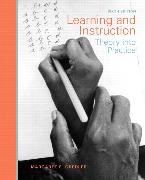Read more
List of contents
Chapter 1 Overview
What is the Role of Learning in Everyday Affairs?
What are the Pre-Theoretical Attempts to Explain Learning?
What are the Criteria for Learning Theory?
What are the Functions of Learning Theory?
How Have Changes in Society and Other Events Influenced the Development of Learning Theory?
What is the Philosophy Referred to as Constructivism?
What is Educational Constructivism?
How Does This Text Present Knowledge About Learning?
Chapter 2 Early Learning Theories
Classical Conditioning and Connectionism
Chapter 3 The Human Brain
Organization and Development
Cognitive and Educational Issues
Cognitive Neuroscience and Learning
Chapter 4 B.F. Skinner's Operant Conditioning
Principles of Learning
Principles of Instruction
Educational Applications
Review of the Theory
Chapter 5 Robert Gagne's Conditions of Learning
Principles of Learning
Principles of Instruction
Educational Applications
Review of the Theory
Chapter 6 Cognitive Perspectives: I. The Processing of Information
Principles of Learning
Principles of Instruction
Educational Applications
Review of the Theory
Chapter 7 Cognitive Perspectives II. Metacognition and Problem Solving
The Nature of Complex Learning
Principles of Instruction
Educational Applications
Chapter 8 Jean Piaget's Cognitive-Development Theory
Principles of Cognitive Development
Principles of Instruction
Educational Applications
Review of the Theory
Chapter 9 Lev S. Vygotsky's Theory of Psychological Development
Principles of Psychological Development
Principles of Instruction
Educational Applications
Review of the Theory
Chapter 10 Albert Bandura's Social-Cognitive Theory
Principles of Learning
Principles of Instruction
Educational Applications
Review of the Theory
Chapter 11 Cognitive Models and a Theory of Motivation
Principles of Motivation
Principles of Instruction
Developing Programs for Motivational Change
Educational Applications
Epilogue
Summary
This comprehensive text takes a models approach by presenting separate chapters on individual theorists and perspectives. Within this well-organized structure, Gredler offers meticulously accurate coverage of contemporary learning theories and their application to educational practice-including issues of readiness, motivation, problem-solving, and the social context for learning. Key content include increased emphases on the contributions of neuroscience and of Vygotsky's work.

